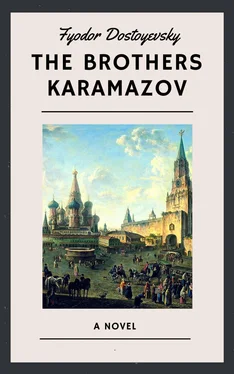It happened one clear, warm, moonlight night in September (many years ago) five or six drunken revelers were returning from the club at a very late hour, according to our provincial notions. They passed through the “back-way,” which led between the back gardens of the houses, with hurdles on either side. This way leads out on to the bridge over the long, stinking pool which we were accustomed to call a river. Among the nettles and burdocks under the hurdle our revelers saw Lizaveta asleep. They stopped to look at her, laughing, and began jesting with unbridled licentiousness. It occurred to one young gentleman to make the whimsical inquiry whether any one could possibly look upon such an animal as a woman, and so forth.... They all pronounced with lofty repugnance that it was impossible. But Fyodor Pavlovitch, who was among them, sprang forward and declared that it was by no means impossible, and that, indeed, there was a certain piquancy about it, and so on.... It is true that at that time he was overdoing his part as a buffoon. He liked to put himself forward and entertain the company, ostensibly on equal terms, of course, though in reality he was on a servile footing with them. It was just at the time when he had received the news of his first wife's death in Petersburg, and, with crape upon his hat, was drinking and behaving so shamelessly that even the most reckless among us were shocked at the sight of him. The revelers, of course, laughed at this unexpected opinion; and one of them even began challenging him to act upon it. The others repelled the idea even more emphatically, although still with the utmost hilarity, and at last they went on their way. Later on, Fyodor Pavlovitch swore that he had gone with them, and perhaps it was so, no one knows for certain, and no one ever knew. But five or six months later, all the town was talking, with intense and sincere indignation, of Lizaveta's condition, and trying to find out who was the miscreant who had wronged her. Then suddenly a terrible rumor was all over the town that this miscreant was no other than Fyodor Pavlovitch. Who set the rumor going? Of that drunken band five had left the town and the only one still among us was an elderly and much respected civil councilor, the father of grown-up daughters, who could hardly have spread the tale, even if there had been any foundation for it. But rumor pointed straight at Fyodor Pavlovitch, and persisted in pointing at him. Of course this was no great grievance to him: he would not have troubled to contradict a set of tradespeople. In those days he was proud, and did not condescend to talk except in his own circle of the officials and nobles, whom he entertained so well.
At the time, Grigory stood up for his master vigorously. He provoked quarrels and altercations in defense of him and succeeded in bringing some people round to his side. “It's the wench's own fault,” he asserted, and the culprit was Karp, a dangerous convict, who had escaped from prison and whose name was well known to us, as he had hidden in our town. This conjecture sounded plausible, for it was remembered that Karp had been in the neighborhood just at that time in the autumn, and had robbed three people. But this affair and all the talk about it did not estrange popular sympathy from the poor idiot. She was better looked after than ever. A well-to-do merchant's widow named Kondratyev arranged to take her into her house at the end of April, meaning not to let her go out until after the confinement. They kept a constant watch over her, but in spite of their vigilance she escaped on the very last day, and made her way into Fyodor Pavlovitch's garden. How, in her condition, she managed to climb over the high, strong fence remained a mystery. Some maintained that she must have been lifted over by somebody; others hinted at something more uncanny. The most likely explanation is that it happened naturally—that Lizaveta, accustomed to clambering over hurdles to sleep in gardens, had somehow managed to climb this fence, in spite of her condition, and had leapt down, injuring herself.
Grigory rushed to Marfa and sent her to Lizaveta, while he ran to fetch an old midwife who lived close by. They saved the baby, but Lizaveta died at dawn. Grigory took the baby, brought it home, and making his wife sit down, put it on her lap. “A child of God—an orphan is akin to all,” he said, “and to us above others. Our little lost one has sent us this, who has come from the devil's son and a holy innocent. Nurse him and weep no more.”
So Marfa brought up the child. He was christened Pavel, to which people were not slow in adding Fyodorovitch (son of Fyodor). Fyodor Pavlovitch did not object to any of this, and thought it amusing, though he persisted vigorously in denying his responsibility. The townspeople were pleased at his adopting the foundling. Later on, Fyodor Pavlovitch invented a surname for the child, calling him Smerdyakov, after his mother's nickname.
So this Smerdyakov became Fyodor Pavlovitch's second servant, and was living in the lodge with Grigory and Marfa at the time our story begins. He was employed as cook. I ought to say something of this Smerdyakov, but I am ashamed of keeping my readers' attention so long occupied with these common menials, and I will go back to my story, hoping to say more of Smerdyakov in the course of it.
Chapter III. The Confession Of A Passionate Heart—In Verse
Alyosha remained for some time irresolute after hearing the command his father shouted to him from the carriage. But in spite of his uneasiness he did not stand still. That was not his way. He went at once to the kitchen to find out what his father had been doing above. Then he set off, trusting that on the way he would find some answer to the doubt tormenting him. I hasten to add that his father's shouts, commanding him to return home “with his mattress and pillow” did not frighten him in the least. He understood perfectly that those peremptory shouts were merely “a flourish” to produce an effect. In the same way a tradesman in our town who was celebrating his name-day with a party of friends, getting angry at being refused more vodka, smashed up his own crockery and furniture and tore his own and his wife's clothes, and finally broke his windows, all for the sake of effect. Next day, of course, when he was sober, he regretted the broken cups and saucers. Alyosha knew that his father would let him go back to the monastery next day, possibly even that evening. Moreover, he was fully persuaded that his father might hurt any one else, but would not hurt him. Alyosha was certain that no one in the whole world ever would want to hurt him, and, what is more, he knew that no one could hurt him. This was for him an axiom, assumed once for all without question, and he went his way without hesitation, relying on it.
But at that moment an anxiety of a different sort disturbed him, and worried him the more because he could not formulate it. It was the fear of a woman, of Katerina Ivanovna, who had so urgently entreated him in the note handed to him by Madame Hohlakov to come and see her about something. This request and the necessity of going had at once aroused an uneasy feeling in his heart, and this feeling had grown more and more painful all the morning in spite of the scenes at the hermitage and at the Father Superior's. He was not uneasy because he did not know what she would speak of and what he must answer. And he was not afraid of her simply as a woman. Though he knew little of women, he had spent his life, from early childhood till he entered the monastery, entirely with women. He was afraid of that woman, Katerina Ivanovna. He had been afraid of her from the first time he saw her. He had only seen her two or three times, and had only chanced to say a few words to her. He thought of her as a beautiful, proud, imperious girl. It was not her beauty which troubled him, but something else. And the vagueness of his apprehension increased the apprehension itself. The girl's aims were of the noblest, he knew that. She was trying to save his brother Dmitri simply through generosity, though he had already behaved badly to her. Yet, although Alyosha recognized and did justice to all these fine and generous sentiments, a shiver began to run down his back as soon as he drew near her house.
Читать дальше












